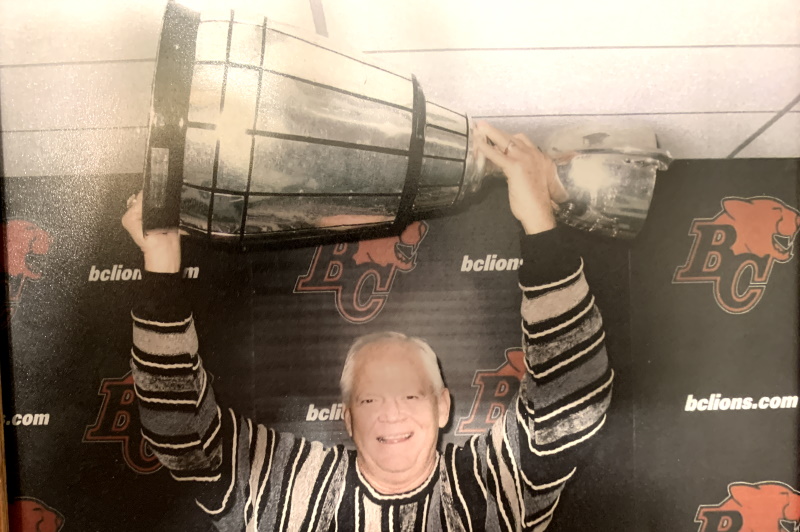Winning is a Universal Language: CFL Legend Dave Ritchie’s European Adventure
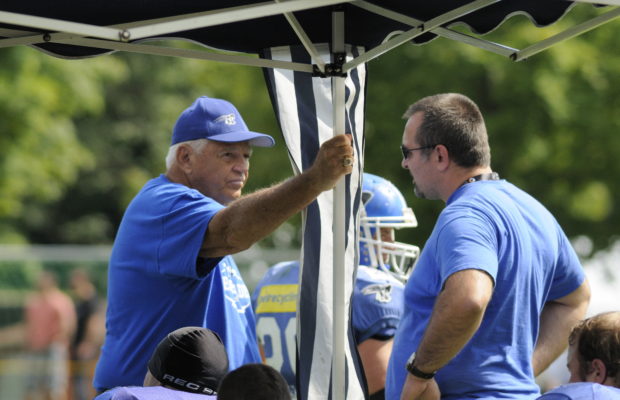
CFL fans know Dave Ritchie well.
He was an intimate part of the league’s football fabric for 25 years, a coaching icon who finished his career seventh all-time in wins by a head coach. He was a six-time nominee for coach of the year, the winner in 2001 with the Blue Bombers, and an integral part of three Grey Cup winning team. As a defensive coordinator, Ritchie helped the Winnipeg defense stifle Tracy Ham in 78th Grey Cup in 1990 and silenced Anthony Calvillo with B.C. in the 94th iteration of the national gathering in 2006, but it’s Ritchie’s lone win as a head coach in between which really stands apart from the rest.
“I think we played in one of the most exciting Grey Cup games of all-time, especially because it was the first one between a Canadian and an American team,” laughs Ritchie about the Lions’ last second victory in 1994 over the vaunted Baltimore Stallions. “Three playoff games and we won each of them on the last play.”
Hoisting Grey Cup in 1994
Lui Passaglia’s heroic kick may have permanently etched Ritchie’s name into the annals of CFL history but it was just a singular moment in an illustrious career that spanned Canada and the NCAA. While fans are well aware of his dual stints in B.C., Winnipeg, and Montreal, and the most knowledgeable among them can recall his college stops at Fairmont State, Brown, and Cincinnati, there is a chapter in his long coaching career that few fully appreciate. It began in the late 1980’s, when the Montreal Alouettes briefly folded and left their defensive backs coach without a job. Forced to return stateside, he found work at his alma mater in Cincinnati but quickly decided he needed a new experience.
“I decided in the spring of 1989 that I would go to Milan, Italy with a good friend of mine named Sark Arslanian to coach the Milano Seamen,” explains Ritchie. “He took the offence, I took the defence and we won a bunch of games.”
The two were already well-established with impressive resumes, both former NCAA head coaches with several years of professional experience. This was the world of John Grisham’s novel Playing for Pizza, a coaching adventure where they were forced to adapt to nighttime practices, small contracts and veteran players who worked full-time. For Ritchie, it was right up his alley and he could not have inherited a better team.
“The Seamen when we had them were good, they were veterans,” he reminisces. “I thought some of those kids could have played in the CFL.”
In his lone season in Italy, the Seamen went 13-1 and won the Italian championship. Ritchie found he loved working with the generally older Italian players and connected with their maturity and understanding of the game much in the same way he relied on CFL veterans.
“I’d usually start training camp with ‘Well, you rookies look left and right because tomorrow you’re not going to be here’,” the old coach chuckles.
Exceptions exist to every rule, however.
“Barron Miles reminded me the other day that he and Ben Cahoon were rookies when I had them in Montreal and they’re in the hall of fame now.”
After winning in Italy, Ritchie returned to Canada and won his first Grey Cup with Winnipeg the following season. Europe would be nothing more than a fun memory over the following two decades of professional coaching. That was until Ritchie retired in 2008 and found himself, like many old coaches, longing for the game he had dedicated his life to.
“I wasn’t completely done, at least in my mind. If it weren’t for my bypass surgery in 2004, I wouldn’t have even thought about retirement,” he explains.
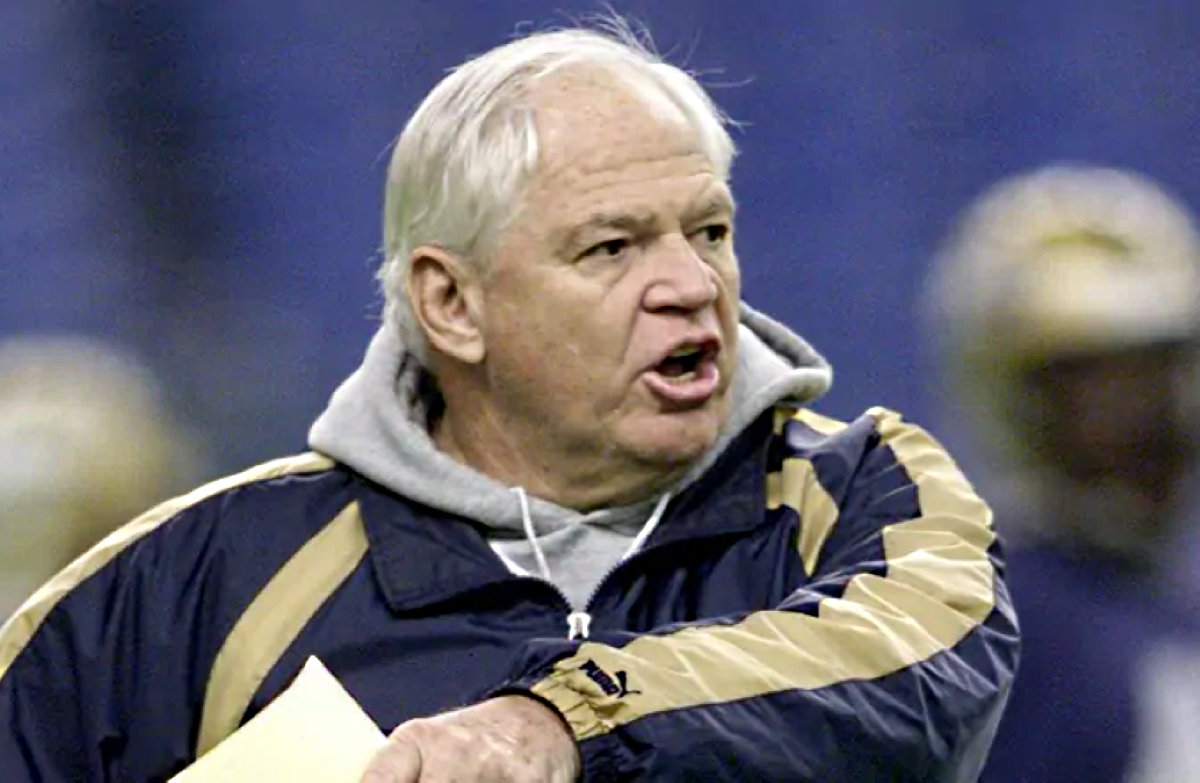
Photo: Ryan Remiorz/Canadian Press
Searching for his next coaching fix after three years out of the game, Ritchie reached out to his former Public Relations Director with the B.C. Lions Roger Kelly, now living in Sweden and involved in the international game, to see if there was any opportunities available. Next thing he knew, Ritchie and his wife were on a flight bound for Zurich, Switzerland.
“I’ve been very blessed. I’ve been married to a woman for sixty-one years who if I walked in the door tomorrow and said we’re moving to China, anywhere, she would pack up our gear and off we’d go.”
While the setting was equally beautiful, the Zurich Renegades were not the Milano Seamen of the late eighties. Ritchie was taking over a struggling football team.
“When I got there in 2011, there wasn’t a lot in the cupboard. They didn’t have many really good football players, so we had an average season,” he admits.
Much like his CFL career, Ritchie turned things around with a reliance on veteran leadership.
“I came back in 2012 and all the core guys we needed to make that team successful were sitting in the first meeting. I thought to myself ‘Holy moly, here we go’,” he laughs. “I think out of a 10-game season we had eight shutouts.”
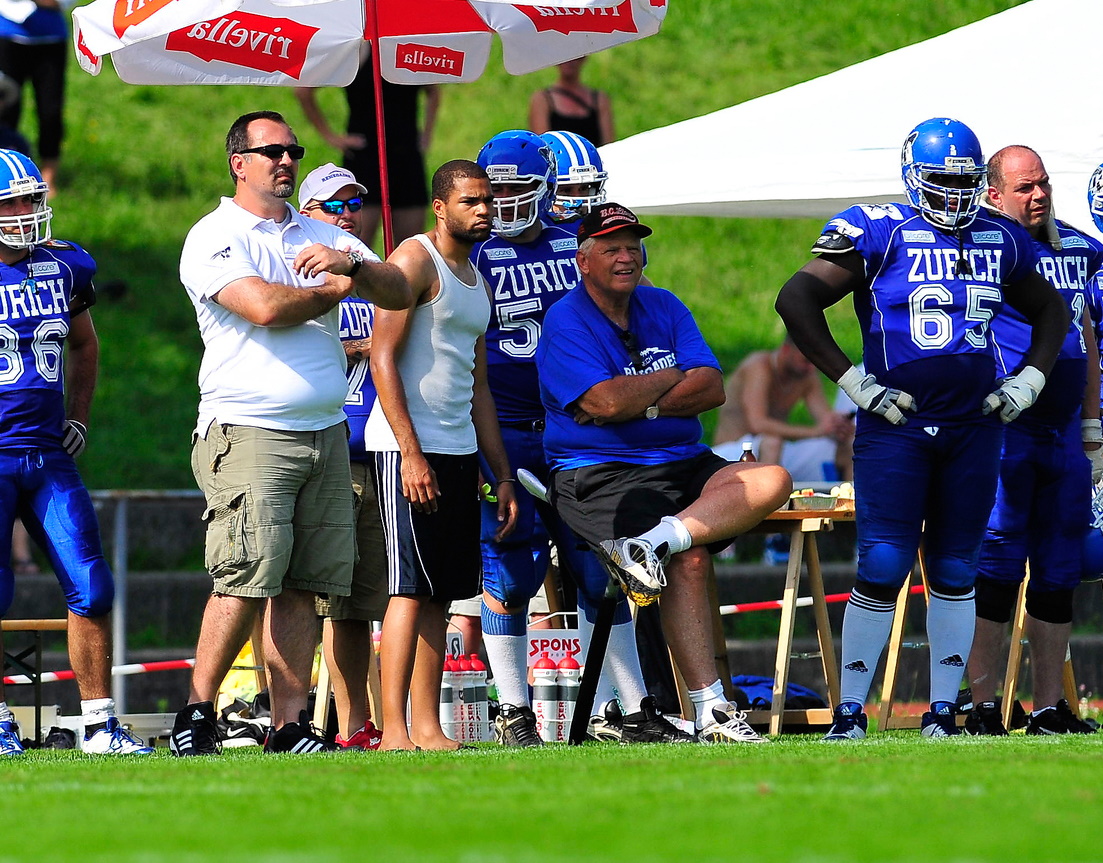
Dave Ritchie guiding Zurich Renegades, June 2012
The Renegades ended up losing in the Swiss league semi-finals, but the experience was one of the most fun in Ritchie’s long career. He came away with a deep respect and admiration for the passion of European football players.
“How would you like to go to practice at 8:30 every night and be finished at 11:30? It’s really unbelievable. Then they get up the next morning and go to their jobs. Some of them travel on the train from Italy to get to practice,” Ritchie marvels. “They do it for the love of the sport. They pay for their own gear and they pay to play. These kids are above and beyond a normal football player. It is really a credit to them that they come out.”
Dave Ritchie knows talent. As a young prep school athlete in Ohio, he competed against “The Logo” Jerry West and 1960 Heisman Trophy winner Joe Bellino. As a freshman basketball player at Cincinnati, he shared the court with NBA legend Oscar Robertson. Over the course of his CFL career, he coached 31 different Hall of Famers and that number will likely grow. Now looking from the outside, he strongly believes that European talent could contribute to the CFL.
“There is some good players over there, some really good players. They just don’t get the same exposure as Americans,” Ritchie explains. “If they get that, maybe they can make an impact for a team.”
That lack of exposure is something he witnessed hurting players first-hand.
When he arrived in Zurich, Ritchie met a six-foot-three, 300-pound lineman named Steven Fiadewornu with dreams of professional football. The youngster became the latest disciple of the coach Less Browne once referred to as the “Pied Piper” of the CFL, for his ability to build relationships with players and get them to follow him from team to team. By year two, Ritchie was using him on both sides of the ball.
“He came up to me in his second year and he said ‘Coach, do you think I have a chance to play pro if I goto a college in America’,” recalls Ritchie.
The veteran coach believed in his potential and helped him get a scholarship with Robert Morris University in Pittsburgh, even giving him a place to live in the Ritchie household. NCAA eligibility issues stemming from the semi-professional nature of European football kept him off the field at the start, but it wasn’t long before the Swiss product was starting at defensive tackle for the Division One FCS school.
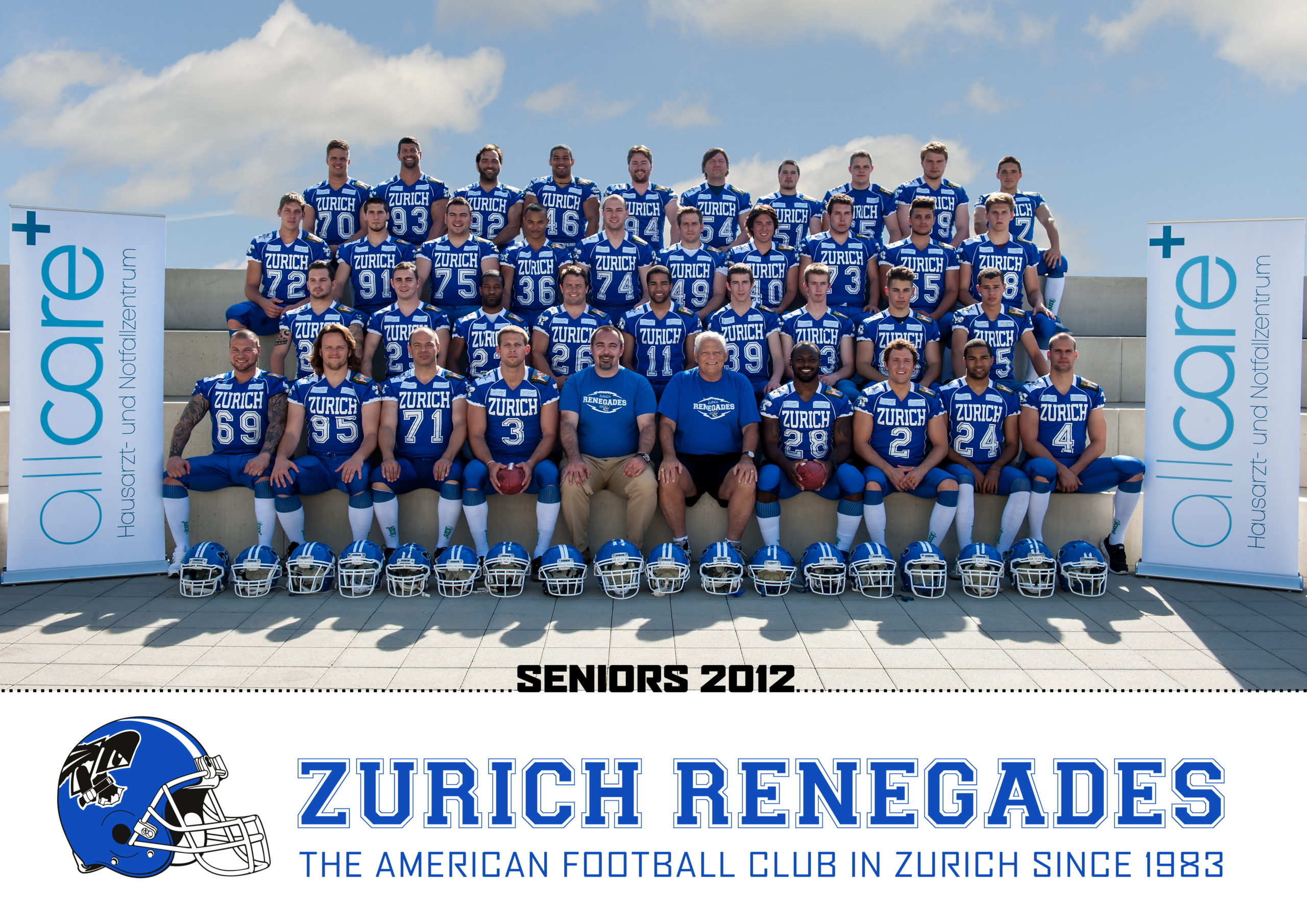
Unfortunately for Steven, his big football break came just a little too late. Like most European prospects, he had picked up the sport as a young man and by the time he graduated, he was simply too old to get
any serious professional attention.
“When he came over, we kept saying we were going to get him in the CFL if he had good years. Well, he had good years, but he was 27 years old when he graduated. I had to say to him ‘Stevie, you’re going to have to find a job outside of football’,” Ritchie admits.
Steven’s story has a happy ending. He now lives permanently in Pennsylvania, turned his college degree into a successful business career, and is newly married with a baby on the way. Ritchie has a lot of pride for how his European project turned out but hopes new international initiatives like the CFL’s make the journey a little easier for the next diamond in the rough.
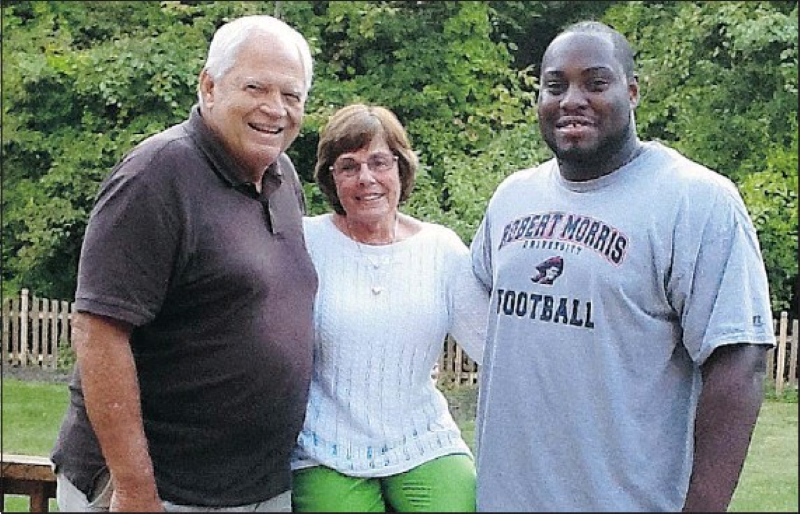
Dave Ritchie, Sharon Richie and Steven Fiadewornu
Ritchie finally hung up his whistle for good after the 2012 season. He misses coaching and the daily player interactions greatly, but his age has made any serious return an impossibility. He remains one of the game’s true legends, now in 13 different Hall of Fames and walls of honor. Perhaps most importantly, he is a coaching thread that binds players across continents. Whether you played for the B.C. Lions, Milano Seamen, Zurich Renegades, Montreal Alouettes or Winnipeg Blue Bombers, he would demand the best of you between the lines but always keep his office door open for a chat. Winning, it’s said, is a universal language. If that is truly the case, then fans in Canada, Switzerland and Italy can all understand each other when it comes to Dave Ritchie.
